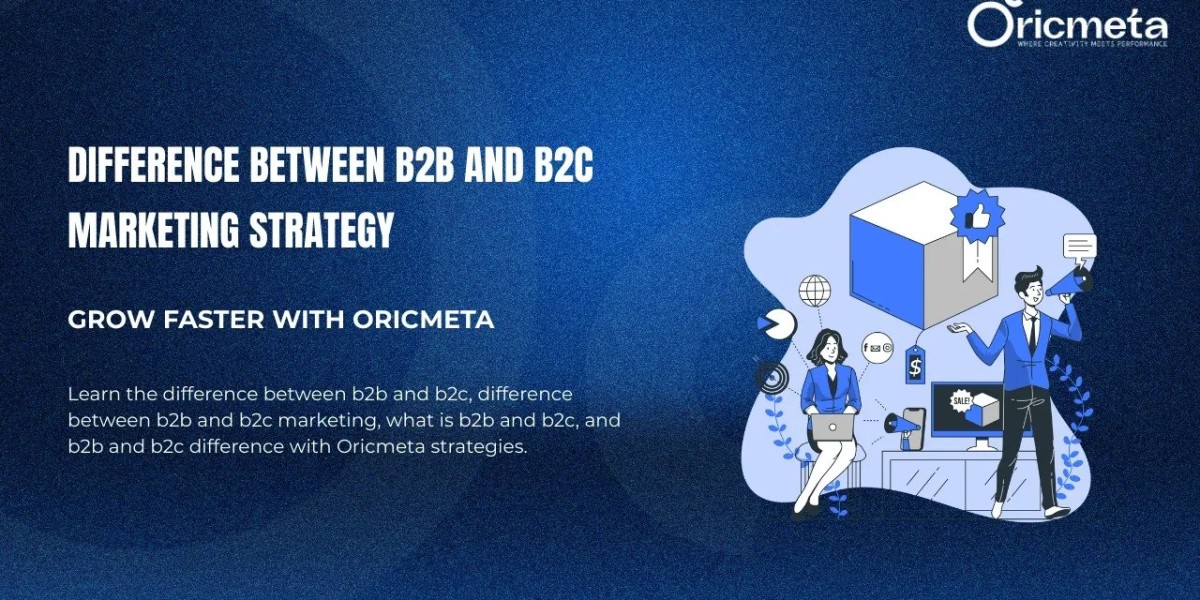Difference Between B2B and B2C Marketing | Oricmeta
Introduction
Have you ever wondered why a company selling software to other businesses runs ads on LinkedIn, while your favorite clothing brand shows up on Instagram? The reason lies in the difference between B2B and B2C marketing.
Understanding what is B2B and B2C is like learning the difference between a tailor-made suit and an off-the-rack shirt. Both are clothing, but they serve different purposes and audiences. In the same way, B2B (Business-to-Business) and B2C (Business-to-Consumer) marketing share the common goal of driving sales, but the strategies, communication styles, and customer journeys vary widely.
In this blog, we’ll break down the difference between B2B and B2C marketing step by step, so you can see how businesses tailor their approaches to suit their audiences. Let’s dive in.
Discover the difference between B2B and B2C, what is B2B and B2C, and the difference between B2B and B2C marketing explained simply and clearly.
What is B2B and B2C?
Before we jump into the differences, let’s clarify the basics.
B2B (Business-to-Business): This is when one business sells products or services to another business. Example: A software company selling project management tools to a corporation.
B2C (Business-to-Consumer): This is when a business sells directly to the end consumer. Example: A clothing brand selling t-shirts online.
Simply put, B2B serves businesses, while B2C serves individuals.
The Core Difference Between B2B and B2C Marketing
The biggest difference between B2B and B2C marketing lies in the target audience. B2B focuses on solving professional needs, while B2C focuses on personal desires.
Think of it like this: B2B is like a conference room discussion where logic and return on investment matter, while B2C is like a shopping mall experience where feelings and trends drive decisions.
Audience Focus: Businesses vs. Consumers
B2B Audience: Decision-makers, managers, or executives looking for solutions to improve operations or cut costs.
B2C Audience: Everyday customers who want convenience, lifestyle improvements, or entertainment.
For example, Microsoft sells Office 365 differently to enterprises than Netflix sells subscriptions to you and me.
Decision-Making Process in B2B and B2C
B2B: Involves multiple stakeholders, longer research, and formal approval processes.
B2C: Usually quick, emotional, and influenced by instant gratification.
A CEO buying software will research case studies, while you buying a pizza might take just a few seconds to decide.
Emotional vs. Rational Buying Behavior
B2B Purchases: Driven by rational factors—ROI, efficiency, scalability, cost-effectiveness.
B2C Purchases: Often influenced by emotions—brand appeal, desire, trends, peer pressure.
That’s why B2B marketing talks about “saving time and resources,” while B2C says, “Feel good wearing this!”
Marketing Channels Used in B2B and B2C
B2B Channels: LinkedIn, webinars, trade shows, email campaigns.
B2C Channels: Instagram, TikTok, TV ads, influencer partnerships.
Both might use Facebook, but how they use it differs drastically.
Content Strategy Differences
B2B: Whitepapers, case studies, webinars, in-depth blog posts.
B2C: Short videos, social media posts, reviews, user-generated content.
B2B educates, while B2C entertains.
Sales Cycle: Short vs. Long Journeys
B2B Sales Cycle: Longer, requiring nurturing, trust-building, and negotiations.
B2C Sales Cycle: Shorter, often completed within minutes or hours.
Buying a car (B2C) may take weeks, but signing a corporate software contract (B2B) may take months.
Branding in B2B and B2C
B2B Branding: Focuses on credibility, trust, and expertise.
B2C Branding: Emphasizes relatability, lifestyle, and emotional connection.
For instance, IBM focuses on reliability, while Nike inspires with “Just Do It.”
Pricing Models and Approaches
B2B Pricing: Custom quotes, bulk discounts, subscription models.
B2C Pricing: Fixed prices, seasonal sales, discounts, buy-one-get-one offers.
The same SaaS software may cost thousands annually for businesses, while a consumer app may charge just $10/month.
Customer Relationships and Retention
B2B: Relationship-based, with account managers and long-term partnerships.
B2C: Transaction-based, where customer loyalty depends on satisfaction and convenience.
B2B often involves contracts, while B2C may rely on quick repeat purchases.
Examples of B2B and B2C Marketing
B2B Example: HubSpot’s inbound marketing campaigns targeting businesses.
B2C Example: Coca-Cola’s emotional storytelling ads targeting individuals.
Both succeed, but with different approaches.
Common Challenges Faced
B2B Challenges: Long decision cycles, convincing multiple stakeholders, high competition.
B2C Challenges: Standing out in a crowded market, handling fast-changing consumer preferences.
Marketers must adapt constantly in both worlds.
The Role of Technology and Digital Tools
Technology has blurred the lines between B2B and B2C. AI chatbots, CRMs, personalization, and data analytics are now vital for both.
Still, how they’re applied differs: B2B uses CRM for client management, while B2C uses personalization for shopping experiences.
Conclusion and Key Takeaways
The difference between B2B and B2C marketing is not about which is better, but about which fits the audience.
B2B is logical, relationship-driven, and slower.
B2C is emotional, fast-paced, and focused on individuals.
Whether you’re a marketer, business owner, or curious reader, knowing the difference between B2B and B2C helps you see why companies market differently.
Just like choosing the right key for a lock, businesses must pick the right approach to fit their audience.
FAQs
1. What is B2B and B2C in simple words?
B2B means businesses selling to other businesses, while B2C means businesses selling directly to individual consumers.
2. What is the main difference between B2B and B2C marketing?
B2B focuses on logic, ROI, and relationships, while B2C focuses on emotions, lifestyle, and quick buying decisions.
3. Which marketing channels work best for B2B and B2C?
B2B works best on LinkedIn, webinars, and email, while B2C thrives on Instagram, TikTok, and influencer marketing.
4. Is the sales cycle longer in B2B or B2C?
B2B has a longer cycle due to approvals and research, while B2C is usually quick and impulsive.
5. Can a company do both B2B and B2C marketing?
Yes, some companies like Amazon serve both businesses (Amazon Business) and consumers (Amazon.com).





